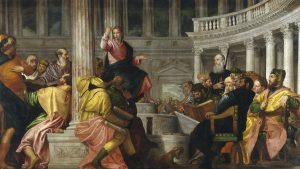Fr Neil’s homily at Mass on Septuagesima Sunday (31 January)
He taught them as one who had authority, as not as the scribes.
In our Old Testament lesson from Deuteronomy Moses states that ‘the Lord will raise up a prophet like me from among you,’ which begs the question of what it is to be a prophet like Moses? All of humanity’s history is marked by the quest to answer two fundamental questions: Where do we come from, what are my origins? Where are we going, what is my destiny and my end?
Religion in human experience — and in more modern times science as well — has sought to try and answer these questions. They are important questions because to have some handle on these fundamentals provides identity, meaning, purpose and inner joy.
Yet fallen humanity desires answers to these questions not only for a sense of meaning and purpose, but also because of the overwhelming desire to have the power to be in control and dictate our final destiny.
This temptation may be particularly strong at times of crisis especially when we are continually being told that we should be afraid and terrified as death lurks around every corner. While it is sensible to take reasonable precautions, a message of fear will have ongoing consequences far beyond any present crisis.
This is why human culture has always had those who practised divination such as soothsayers, mediums, wizards, augurs, charmers and necromancers, all of which are roundly condemned as an abomination to the Lord. In science this thinking is also found in part driving the motivations towards abortion, euthanasia, cloning, cryogenics and research into halting the ageing process — much of which is also an abomination unto the Lord.
The office of prophet in Israel’s religious life marked them out from the pagan nations around about them. It is also why the Lord was so insistent that his people should not take on and be contaminated by the pagan practices around them. We hear the Lord also speaking strongly against the false prophets who had fallen into becoming soothsayers to try and console those they served.
All the true prophets were able to read the signs of the time because of their relationship with God and they spoke God’s word revealing his will and purpose to his people. Their message was more often than not the same, ‘don’t look elsewhere for knowledge in the vain attempt to be in control and secure your future.’ Do not forget your God, look to him in faith and trust, follow his commandments, make your sacrifice and you will not court disaster and bring judgement upon your head.
The significance of the prophet then is the manner in which he speaks the words of God. To add to the authenticity of his words we often hear the repeated refrain, “It is the Lord who speaks.” This is especially true of Moses, whose particular role had such significance not because of the miracles the Lord worked through him — the plagues and parting of the Red Sea — important though they were, but that he spoke with the Lord directly, as a man speaks to his friend. Through this dialogue with God Moses received the law, interceded for the people of God, set a pattern of worship based on the heavenly realities, and spoke the word of God to his people.
Moses’ prophetic role was to point people beyond their desire to know and control their future: to point to the true exodus and path that all humanity needs to walk, seeking our way into a relationship with God our true heart’s desire.
This new prophet whom God would raise up like Moses carries an even greater expectation that he would mediate an even greater covenant, one received not from talking with God or seeing a glimpse of his glory as Moses did, but while not only speaking but by seeing God face to face.
We hear in the prologue of John; “No one has ever seen God, it is the only Son, who is nearest to the Father’s heart, who has made him known.” This prophet communicates with God not as a friend but with the intimacy of the Son.
Our Lord speaks with profound authority, not through the loudness of his voice or the manner of his presentation, but because he speaks as Son of the Father — as God himself. He leads those willing to follow into a new Exodus, not to a land and temple patterned on the heavenly realms but to the true heavenly homeland and temple of the Father’s glory. He invites us to hear his authoritative voice as guide and promise, in the Scriptures and the Magisterium of the Church.
He feeds us on our journey with the true bread from heaven.
To travel on this new exodus we are to give up all idols that we have hoped would secure our future, and hear the voice of God himself who speaks truths that are eternal and unchanging. It is the hearing and receiving of his eternal Word that calls us to our exodus from the fallen world and the old Adam, into communion with him in the Godhead. This is our redemption, and the fulfilment of the longing of our hearts that all humanity has been seeking and searching for since the moment of our creation.
The law was given through Moses, grace and truth have come through our Lord Jesus Christ!








 Posts
Posts